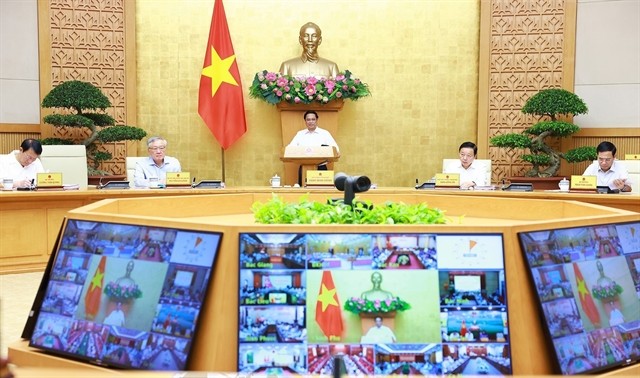
He set the targets while speaking at the Government's monthly meeting on Monday.
The PM underlined Vietnam's upward economic trajectory in the first nine months of the year, with a 7.4 percent GDP growth rate in Q3.
He also highlighted the country's political stability, enhanced defence, and strengthened international engagement. He said successful diplomatic initiatives had fostered a conducive environment for growth.
Despite the robust performance, he acknowledged several ongoing challenges, including the slow public investment disbursement, which reached only 47.3 percent of the plan after nine months, and the persistent difficulties in the real estate market.
The PM also underscored the immense pressure on Government finances caused by Typhoon Yagi, which inflicted a staggering VND82 trillion (US$3.3 billion) in economic losses to the country.
To address these challenges, the Prime Minister urged relevant ministries and agencies to accelerate public investment disbursement to achieve at least 95 percent of the plan by the end of the year.
He also urged them to quickly eliminate legal obstacles that delay social housing projects and accelerate preferential loan programs to make social housing accessible to a wider range of buyers.
Several policy goals for the State Bank of Vietnam were outlined, including stablising exchange rates, lowering interest rates, and expanding credit availability. He also mandated an annual target of around 15 percent in credit growth for the central bank.
The Ministry of Finance was instructed to investigate the feasibility of issuing VND100 trillion (US$4 billion) in bonds to fund critical national infrastructure projects. He urged the ministry to maintain price stability for essential goods and services, and carefully manage the prices of State-regulated ones.
The PM also urged the ministry to boost fiscal revenue, cut costs, prioritise development spending, and accelerate digital transformation and mandatory e-invoicing.
The Ministry of Finance was told they must increase fiscal revenue by at least 10 percent above the forecast by the end of the year.
The Prime Minister also called for immediate actions to address long-standing issues, including troubled banks, Vietnam Airlines' restructuring, the expansion of Bach Mai and Viet Duc hospitals, and the projects entangled in audits and legal disputes.
He also urged expedited institutional reforms, regulatory overhauls, and digital transformation. He highlighted the need for streamlined administrative processes for a better business climate and accelerated progress on the national data center.
The PM also urged increased public-private cooperation, high-tech FDI, market diversification, stronger business support, domestic demand stimulation, the promotion of "Vietnamese people use Vietnamese goods" campaigns, and the widespread adoption of cashless payments.
Ministries and agencies were instructed to take decisive action to eradicate substandard housing nationwide and quickly implement the semiconductor workforce development strategies.
He also called for action to foster new growth drivers, especially in high-tech sectors such as semiconductors and Artificial Intelligence.
Additionally, they were urged to take measures to fight corruption, deepen international engagement, and improve public communication.
"Ministries and agencies must make it a priority to listen to the voices of the people, businesses, and international organisations and act upon their recommendations," said the Prime Minister.
The PM did praise several local governments for their efforts to overcome challenges and contribute to the country's achievements. Notably, Hanoi and Ho Chi Minh City demonstrated their leadership by contributing more than half of the national budget.
The provinces of Lao Cai, Quang Ninh and Hai Phong were commended for their effective disaster response, and the robust economic growth in Bac Giang, Thanh Hoa, Ha Nam, Khanh Hoa, Dien Bien, and Lai Chau was highlighted as a testament to their perseverance.
























